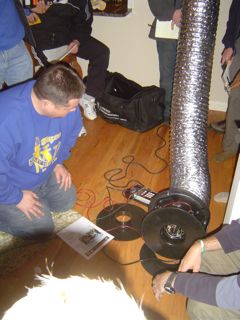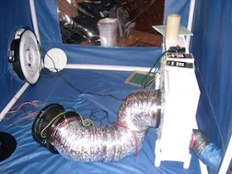How to Choose a HERS Rater Training Class

 In the past couple of years, the number of organizations offering some kind of training or certification for home energy auditors or home energy raters has grown rapidly. As I’ve discussed here before, some energy auditor certifications are scams, and only two certifications really matter: HERS and BPI.
In the past couple of years, the number of organizations offering some kind of training or certification for home energy auditors or home energy raters has grown rapidly. As I’ve discussed here before, some energy auditor certifications are scams, and only two certifications really matter: HERS and BPI.
In the past couple of years, the number of organizations offering some kind of training or certification for home energy auditors or home energy raters has grown rapidly. As I’ve discussed here before, some energy auditor certifications are scams, and only two certifications really matter: HERS and BPI.
Even after eliminating all the bogus certifications out there, though, it can still be daunting to find a training provider that will get you where you want to go with HERS or BPI. If you’re looking for a training class to attend, here are some questions to ask. I’ll focus on HERS here, but many of the same questions will apply to BPI training as well.
Are you in Florida or California?
These two states have laws governing the HERS industry, so your options are limited if your business is in one of them. In California, you must get your HERS training with either CalCERTS or CHEERS. In Florida, FSEC is the only HERS training provider, but you can take a HERS class through another HERS trainer and then challenge the Florida HERS rater test.
Who are the instructors, and what are their backgrounds?
You may find it difficult or impossible to learn the names and backgrounds of your instructors in some HERS rater training classes. These classes aren’t cheap, however, so it’s a good idea to find out who the instructors are and how much experience and training they’ve had in:
- Building science – You want someone who understands heat transfer, for example, way better than you’ll need to know it.
- Building, improving, and analyzing homes – An instructor who has spent significant time in the trenches will be more helpful than one who doesn’t have that experience.
- Education – Have they studied teaching and learning? Do they have real education experience, or are they just a contractor looking for an easier way to make money?
Another good indicator is the involvement of the instructors in the industry. Have they spoken at the RESNET conference? Do they serve on RESNET committees? Are they involved with setting the energy code for their state?
What do their students say?
Does the HERS training provider’s website include testimonials? Will they give you references so you can call some of the students they’ve trained? You can’t always believe testimonials you see on websites, and of course no company is going to include the bad ones, but lack of testimonials or references is probably a good enough reason by itself to choose another HERS rater class. Tomorrow I’ll post a list of questions you can ask former students when you call or email them.
You can also find some info online about students’ experiences with various HERS training programs. Sean Lintow of SLS Construction, for example, blogged throughout the week of his energy rater class at Southface and later wrote an article about the HERS certification process. [Disclosure: Sean signed up with EVER as his provider, and I was one of his instructors in the Southface HERS class.]
Does the class depend heavily on instructor-led presentations, or is the majority of the class filled with learning activities for the students?
The majority of education – K-12, college, and adult – relies on lecture. The funny thing is, education research shows definitively that lecture is the least effective method available. Find out – from the training organization and their students – how long the stretches are where you’ll be trying to follow while the instructor stands in front of the class doing his thing. One hour max would be good. Sitting on your butt listening all day is not good.
Will you actually learn how to use the Blower Door and Duct Blaster?
In some rater training classes, you will leave at the end not knowing how to do a Blower Door or Duct Blaster test. They’ll show you how to do it, but you won’t actually set it up and run it yourself, so you’ll be lost the first time you find yourself in a house with pressure  testing equipment. FSEC in Florida excels at teaching pressure testing because they’ve developed a small pressure testing tent (photo at right) that every student gets to spend time in during the class. Instead of an oral exam, the students actually have to demonstrate proficiency. Other trainers also have methods that work, but you want to make sure that you’ll actually operate the equipment in the class you choose.
testing equipment. FSEC in Florida excels at teaching pressure testing because they’ve developed a small pressure testing tent (photo at right) that every student gets to spend time in during the class. Instead of an oral exam, the students actually have to demonstrate proficiency. Other trainers also have methods that work, but you want to make sure that you’ll actually operate the equipment in the class you choose.
How long will it take to get your certificate of completion?
To become a certified rater, you have to sign up with a HERS rating provider after you take the HERS training class. Your provider cannot certify you until they have a copy of your HERS training certificate, showing that you’ve completed all HERS training requirements successfully. Some training providers do not have a firm deadline by which you’ll receive your certificate and end up taking months to get it to their students. Some have a deadline, such as 3 weeks after the end of the class. A few will give you your certificate before you leave the class.
What’s the trainer’s pass rate on the HERS rater test?
The national HERS rater test is rumored to have a pass rate of about 65%, and, based on my experience in the industry, that sounds reasonable. (See my earlier post on the question, is the HERS rater test too hard?) Some training providers, however, have pass rates close to 100%, whereas others are able to get fewer than 50% of their students through the test on their first attempt. This is important information to find out because each additional time you take the test, you’re probably going to pay $100 or more.
Energy Vanguard is a HERS training provider, and we’ll be happy to answer any questions you may have about our home energy rater class. See our HERS rater training page for more info and to register. Our next class is 14 August 2010.
This Post Has One Comment
Comments are closed.

Would like to know when next
Would like to know when next class starts, how long & cost.